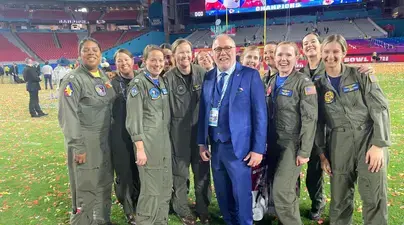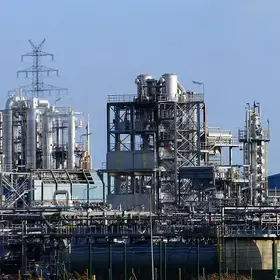During his 37-year career, Sports Management graduate program lecturer Bill Squires has overseen operations, including security, for some of the most significant events in sports, such as Major League Baseball’s World Series, the FIFA World Cup, and the Miami F1 Grand Prix. He has managed venues including Yankee Stadium, Giants Stadium, Cleveland Browns Stadium, and the ESPN Wide World of Sports Complex at Walt Disney World. This February, he’ll work the Super Bowl for the 11th year in a row.
Prior to entering the sports and entertainment facilities and event management industry, Squires attended the United States Naval Academy and became a Navy pilot with almost 24 years of active and reserve duty, which he says prepared him for the high-pressure and demanding nature of working on major events.
Squires has been an integral part of the M.S. in Sports Management program since joining in 2007, only the second year of the program. In this interview, he describes how he uses storytelling in his Sports Facilities and Events Management course, why you need to be passionate about the work, and how he is not close to retiring anytime soon.
Please briefly describe your current role outside of SPS.
I am an operations consultant for the New York Football Giants and MetLife Stadium. I serve on committees for various organizations, such as the National Center for Spectator Sports Safety and Security [NCS4] and the Sports League Sub Council, which advises the Department of Homeland Security on security issues regarding sports venues, leagues, and federations. I also work as an expert consultant and witness in lawsuits involving sports and entertainment facilities.
What does it take to work on a major sporting event like the Super Bowl?
Those of us working in the sports and entertainment facilities and events management industry always strive for that perfect event. The Super Bowl is a massive event with many moving parts that requires thousands of people to make it successful. I have worked in the service level in the host stadiums and the access points to the field, which are restricted areas. The typical Super Bowl workday is about 18 hours, so it requires serious stamina and vigilance to ensure that only people with the proper credentials are in these areas. We don’t get to watch any of the games live, so it is not glamorous, but when I depart for home the day after the game, there is a sense of accomplishment and gratitude for another learning experience.
I’ve worked the NYC Marathon, another huge event requiring extraordinary planning, staff, and partnerships to ensure success. The logistics of a marathon are mind-boggling, and the execution of the event is always incredibly impressive.
Can you share any favorite anecdotes from your career?
I’ve met a lot of incredible people, including five U.S. presidents, Pope John Paul II (twice), Bruce Springsteen, and Mickey Mantle, just to name a few. One unique anecdote is that in 1996, when I was assistant general manager of Giants Stadium, President Clinton was in New York City for an event, and he needed a place to jog in the morning. The Secret Service found out that the stadium had an indoor practice facility, so they reached out to me and asked if I’d be willing to open it up for the president, which of course I was. While I was waiting for the president to arrive that morning, they asked if I wanted to join him on his run, and I did!

Bill Squires on the field after the 2023 Super Bowl with the all-female U.S. naval aviator team that performed the flyover of State Farm Stadium after the national anthem. Last year was the 50th anniversary of women in naval aviation.
How does your work influence your Sports Facilities and Events Management course?
I have an extensive background in the industry, so my approach to teaching is through storytelling. I’ve worked and attended hundreds of events, which have provided countless stories that speak to the subjects we cover in class.
I also have many contacts in the field who speak to the class and give students unique access to events and venues in New York City, the United States, and overseas. Every year, my students visit MetLife Stadium on a Saturday in October. We have two classes and lunch, and then I give them a behind-the-scenes stadium tour. Students have told me it’s one of their best learning experiences.
What is one thing you hope students take away from your course?
On the first day, I tell the students that they will learn about and should remember how complex operations and event teams work (nights, weekends, holidays, and very long hours) so they will always appreciate what they do. Also, I tell the students that they will never attend a sporting event and view it like they did before taking the class. I think alumni would confirm that.
What do you see for the future of your career?
The New York/New Jersey 2026 Men’s World Cup recently hired me as a consultant. Although I worked the 1994 Men’s World Cup, the event has grown to 48 teams and 104 games in three countries. I always want to be involved in new events that will broaden and expand my knowledge and skill set, and I look forward to sharing those experiences with my students.
I have no plans to retire, and I will continue teaching the course at SPS for as long as possible. I am a spry 70-year-old man. I love what I do. I enjoy sharing my knowledge with the next generation of leaders in the industry, and I want to make a difference in the Sports Management program. As long as my brain is working, I will be working.
About the Sports Facilities and Events Management Course
Bill Squires’s Sports Facilities and Events Management course provides students with an understanding of the complexity involved in sports facility and event management. Sports facility management includes a variety of activities such as planning and designing a sports facility, staff management, facility marketing, developing revenue streams, and facility scheduling and operating. Sports event management consists of identifying goals of the event and coordinating people in the organizations involved to achieve those goals with the resources available.
About the Program
The Columbia University M.S. in Sports Management provides students with a comprehensive curriculum and access to sports industry practitioners and influencers. Students acquire skills in areas such as entrepreneurship and innovation, global sports management, facility and event management, and sports law and ethics.


